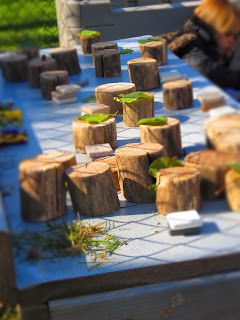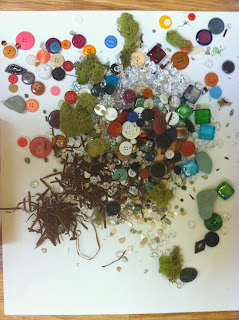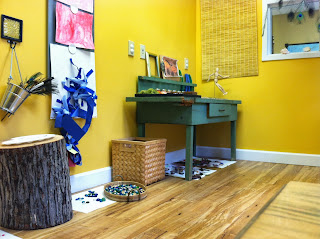Tour The Compass School Cincinnati!
The Compass School
Tuesday, March 25, 2014
Tour our School!
Tour The Compass School Cincinnati!
Wednesday, February 5, 2014
Using the Project Approach to Learning
The Compass School follows an emergent curriculum with the
use of the Project Approach in our Reggio-Inspired School. Using the project
approach allows the educators and students to select project topics that emerge
from the interests of the student. Within this project, all of the academic
content areas will be covered to securely expose children to the readiness
skills of their academic journey.
Each project has three phases. In the first phase, the
children are discussing ideas and knowledge they have on the given project
topic. Through these conversations- that can occur during play or in small
group settings- the children begin to verbalize specifics within the topic that
they want to learn more about thus transitioning the group to the second phase:
discovery. In this phase, children and educators together act as researchers.
They travel into the community on field experiences to gather evidence or the
students invite field experts into their classroom to gain more information on
their given project. They research to find their answers through media and
experiments. Children use art and sketching to work through new ideas and
understandings as they gather more information on their project and begin
compiling this new found information. In the final stage of the project, the
children work to display this information within their community. They work as
a group towards a singular goal which translates to a culminating event. This
event is typically shared with their community members including peers,
parents, and local organizations.
Please enjoy a short explanation of a completed project at
the Compass School.
In the winter of 2012, the Think Tank class began a learning
journey with Pizza! Below are the observations of the classroom teacher:
“With little
deliberation, the Think Tankers quickly found their next learning project:
pizza!! The children were very motivated to learn to prepare and cook pizza.
This interest extended to serving this pizza for to their parents. The Think
Tankers were bouncing with the excitement to begin this new project!
Our project started with a fresh collection
of library books to study baking, recipes, the food groups, and our senses!
Organizing food quickly became a large interest for many of the students. They
leafed through magazines wondering, “Is this food a grain? Fruit? Vegetable?”
With this curiosity, the children clipped the food pictures out over many days
and compiled a chart to demonstrate what foods belonged to which categories.
We had a successful pizza-making month in
February! The Think Tankers studied to discover the ingredients and methods to
cooking pizza. In the classroom we explored pizza ingredients by painting with
spices and tomato sauces, sculpting dough, and grating cheese. In this learning
endeavor, the children visited the Young Chef’s Academy to make pizza dough
from scratch and bake their own personal pizzas. The children laughed as flour
flew in the air while they tossed their pizza crust! After the pizzas were
baked, the Think Tankers enjoyed tasting their hard work. The pizza was
finished in record timing!
After their learning experience at the Young
Chef’s Academy, the Think Tankers set to planning their special dinner for
their parent on Valentine’s Day. What a sweet sentiment and gift to give the
parents. The children wrote menus, decorated the room, and divided roles. As
the big day approached, the excited energy grew! As the parents arrived to the
event, the children showed them where to sit, took orders, and served their
family! Everyone enjoyed their dinner and family time together!”
Wednesday, December 4, 2013
Loris Malaguzzi
The Compass School follows the Reggio Emilia learning philosophy. This approach to learning was born in Reggio Emilia,
Italy after World War II by Loris Malaguzzi. As the founder of the philosophy,
Malaguzzi is an inspiration to our school and those within it.
Our philosophy revolves around a singular poem written by
Malaguzzi titled The Hundred Languages. We are sharing it in hopes that you
find it as inspirational as we do:
The Hundred Languages
The child is made on one hundred.
The child has
a hundred languages
a hundred hands
a hundred thoughts
a hundred ways of thinking
of playing, of speaking.
A hundred.
Always a hundred
ways of listening
of marveling, of loving
a hundred joys
for singing and understanding
a hundred worlds
to discover
a hundred worlds
to invent
a hundred worlds
to dream.
The child has
a hundred languages
(and a hundred hundred hundred more)
but the steal ninety-nine.
The school and culture
separate the head from the body.
They tell the child:
to think without hands
to do without the head
to listen and not to speak
to understand without joy
to love and to marvel
only at Easter and Christmas.
They tell the child:
to discover a world already there
and of the hundred
they steal ninety-nine.
They tell the child:
that work and play
reality and fantasy
science and imagination
sky and earth
reason and dream
are things
that do not belong together.
And thus they tell the child
that the hundred is not there.
The child says:
No way. The hundred is there.
-Loris Malaguzzi
Founder of the Reggio Emilia Approach
Wednesday, November 6, 2013
Creating Relationships
We have established that children need time to be
passionate, curious learners. This we know to be true. We also know that
children need time to build relationships with their peers, educators, and
environment. In the Compass School, we place a high value on our children
being an integral part of our community.
Because of this, we focus on building
and extending relationships within our school. The children at Compass create
strong, loving bonds with those involved with our community by staying in the
same classroom, with the same teachers, for approximately eighteen months.
During this time and because of this
time, children develop a sense of belonging with their classroom and those in
it. The bonds created between the children, teachers, and environments are full
of love and respect. With these bonds, our children feel comfortable to take
chances, seek affirmation, and create dialogue.
Our children, teachers, and environment are deeply respected
members of the community built at the Compass School in Cincinnati.
Establishing strong relationships with teachers is crucial in the learning
journey. Without these relationships, children cannot truly feel comfortable to
ask questions or engage in thought-provoking conversations. It is critical for
the child to feel comfort, love, and peace to truly feel capable to extend
their learning.
The Compass School prides themselves on the ability of the
teachers and students to create these harmonious and beautiful relationships
within our school. Our school is truly happy in the community we have
created together.
Wednesday, October 9, 2013
Taking Time
Giving children time is very important at the Compass
School. We strongly feel that children need
time. Time to play, time to interact, time to ask questions, time to make
discoveries, time to reflect, time to try, time to think, time to wonder, TIME!
With this respect for
children, our environment is structured to allow children time. Each school
year, children have an assigned classroom, to which they spend most of their
time. The children are free to take time to interact with their environment and
discover all of its learning opportunities! As mentioned in an earlier post,
the materials and provocations displayed within our classrooms have been
thoughtfully chosen by the teachers.
They are viewed as gifts to the students, and the interactions by the
students with the materials are, in turn, the gift from the student to the
teacher.
Our students are not rushed, but the amount of time given to
the explorations of a day are determined by the students’ interest. The
free-flowing pace of the day gives children time to dive deeply into their
environment. They have time to pursue curiosities, passions, questions, and ideas.
Children take time to conquer navigating small group dynamics, take chances,
and gain confidence.
We believe very strongly that children must be respected in the time they need to engage in their environment. Here are some examples of work created from children who took some time!
Creating a zoo
Extending materials
Layering materials
Construction discoveries
Experimenting with materials
Nature mandalas
Mixed media art
"Things that Fly"
Using materials to problem solve
"The City"
Small group accomplishments
Outdoor discoveries
"Car Garage"
Temporary Art
Wednesday, September 25, 2013
Atelier
The Compass School has opened their newest work space, the Atelier. In the Atelier children are encouraged to explore, imagine, and create! The room has been stocked with an array of open-ended materials that students enjoy in small groups. Some of the materials include small pebbles, rocks, glass beads, oil pastels, tempera paint, moss, yarn, feathers, sponges, and buttons.
With the materials, the children are encouraged to create "temporary art". This is a form of art where the process of creating is the focus. The art is set to be enjoyed for a short period of time with the understanding that the materials will be recycled and used for future art pieces. This process of art creation gives the imaginative minds an outlet!
The process of working in a small group and creating community is heavily encouraged in this work space. Small groups help children gain confidence and assume many helping roles. Children learn negotiating skills, thought organization, and navigating group dynamics. Children are encouraged to share their ideas, build from shared ideas, take risks, and rebuild ideas.
Please enjoy some pictures from our Atelier.
With the materials, the children are encouraged to create "temporary art". This is a form of art where the process of creating is the focus. The art is set to be enjoyed for a short period of time with the understanding that the materials will be recycled and used for future art pieces. This process of art creation gives the imaginative minds an outlet!
The process of working in a small group and creating community is heavily encouraged in this work space. Small groups help children gain confidence and assume many helping roles. Children learn negotiating skills, thought organization, and navigating group dynamics. Children are encouraged to share their ideas, build from shared ideas, take risks, and rebuild ideas.
Please enjoy some pictures from our Atelier.
Inspiration from Nature
Painting easel
Paint Easel
Creation Table
Creative hanging decor made with a tire wheel, scarves, beads, and feathers
Material storage
Entrance to the Atelier
View into the Atelier
An example of temporary art
Friday, June 28, 2013
Building Community
A core component of the Reggio Emilia Philosophy is viewing children as respected members of the community. The image of the child shows that they are capable, passionate, discoverers, and deeply respected.
Our school offers many events and activities to encourage building community with our students. To facilitate a deeply rooted student community, we offer Connecting once a week. Children in the preschool wing participate in visiting other classrooms to engage in current project topics, interact with new materials, and work closely with multiple age levels. The weekly connecting times promotes the interaction among the students within the school.
To strengthen the bonds of the parents in our community, the children of the Compass School host events to include their parents. Classrooms often invite their parents to their culminating event at the end of a project to display their knowledge or hold a special meal to celebrate their relationship. The parents show their respect for the work of the children by attending these functions.
Children at the Compass School routinely invite community members, Field Experts, into their school to share knowledge. Community members learn from the children or the children use the community members as tools to further their investigations and curiosity.
Building community within the school is an extremely important aspect of the philosophy and highly encouraged at the Compass School.
A picture display of the members of the Compass School emphasizing
their relationships.
Photographs displayed in the classrooms to connect families
and children to the school.
"We Are All Tied Together"
An art piece created by Executive Director, Laura Carr, using donated ties
from fathers of the children at the Compass School.
Subscribe to:
Comments (Atom)












































